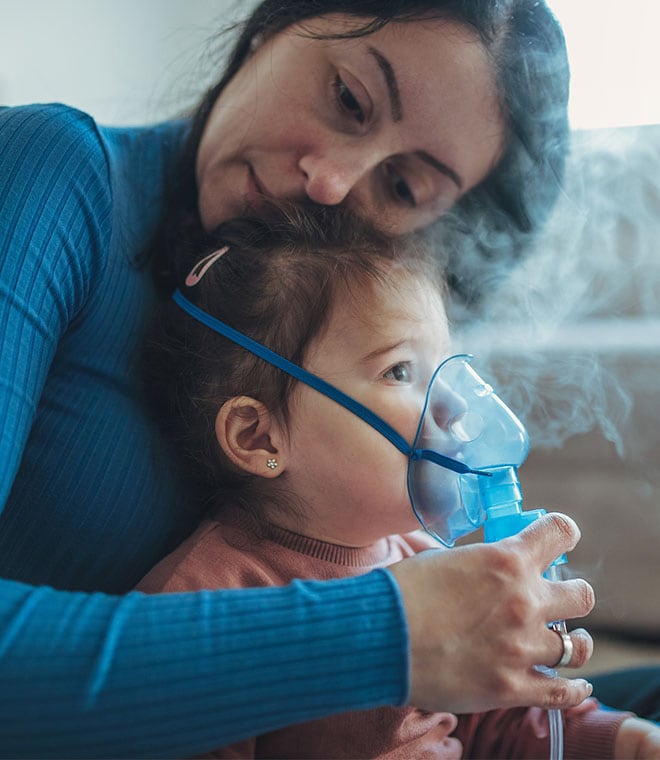Health
Allergy-induced asthma: What you need to know
By Sanjay “Jay” Patel, DO | Allergy & Immunology Jul 07, 2023 • 4 min
About 80% of asthma cases in kids and up to 50% of asthma cases in adults are related to allergic mechanisms occurring in the lungs. Understanding what allergy-induced asthma is and what causes it is an important first step in treating this chronic condition.
Is asthma an allergy?
Asthma is not an allergy. However, some people with asthma may experience symptoms due to allergies.
An allergy is an immune system response to a protein called an allergen. Although an allergen isn’t a threat to your health, your body mistakes it for one, prompting your immune system to release chemicals that trigger symptoms like sneezing, nasal congestion and itchy, watery eyes. Some common allergens include pollen, pet dander, mold and dust mites.
Asthma is a condition where the passages that transport air to and from your lungs become inflamed and/or constricted. It is not the same as an allergy.
Can you get asthma symptoms from allergies?
Yes, some people experience asthma symptoms from allergies. Many factors can trigger asthma, from exercise to exposure to substances like cleaning products and industrial chemicals. Allergies can also lead to asthma. Healthcare providers typically call this type of asthma allergic asthma or allergy-induced asthma. Commonly, asthma sufferers may have more than one type of asthma, such as allergic and exercise-induced asthma.
In people with allergic asthma, the reaction to allergens causes the airways to become inflamed, making it more difficult to breathe. This leads to asthma symptoms, such as:
These symptoms may be persistent, or they may come and go. When symptoms start suddenly and they’re severe, it’s considered an asthma attack. Asthma attacks often require emergency medical care.
How do you treat allergy-induced asthma?
Treatment for allergy-induced asthma usually involves managing both allergies and asthma. Healthcare providers may recommend the following treatments:
Inhaled treatments
Medications that you inhale act directly on the airways to reduce inflammation and prevent the airways from constricting. These drugs may be administered via handheld inhalers or a nebulizer powered by batteries or electricity. If you suffer from mild asthma, your healthcare provider may only recommend an inhaler be used “as needed” for attacks. For people with more severe asthma, inhalers may be used on a consistent basis to help prevent attacks.
Leukotriene modifiers
Oral drugs such as montelukast (Singulair) help control immune system chemicals that trigger allergic reactions and allergic asthma symptoms. Typically, you take one pill daily to treat both asthma and allergies. If your healthcare provider prescribes a leukotriene modifier, you may also be given a rescue inhaler to use when asthma attacks occur.
Immunotherapy
Repeated, controlled exposure to small amounts of allergens over time may help your body learn to tolerate them. Called immunotherapy, these treatments include allergy injections and sublingual tablets that you place under your tongue. National asthma guidelines recommend immunotherapy for allergic asthma since it can help your body become more tolerant to the allergies that cause asthma symptoms. Immunotherapy may also help prevent your asthma from worsening over time.
Limiting exposure to allergens
If you have allergic asthma, you can enhance the effectiveness of treatments by avoiding or reducing your exposure to known triggers. For example, a high-efficiency particulate air (HEPA) filter can remove dust, pollen, mold and other allergens from the air in your home. It can also be helpful to stay indoors on days when pollen counts are high if you have a grass or tree allergy.
Managing allergy-induced asthma
With the right treatment plan, it is possible to manage allergy-induced asthma to reduce the severity and frequency of symptoms. Talk to your healthcare provider about your concerns. They can order allergy tests to determine if you have allergic asthma and help you explore potential treatments.
Updated July 2023.
Sources:
- https://pubmed.ncbi.nlm.nih.gov/33280709/
- https://pubmed.ncbi.nlm.nih.gov/35887659/
- https://aafa.org/asthma/asthma-triggers-causes/allergic-asthma/
- https://my.clevelandclinic.org/health/diseases/21461-allergic-asthma
- https://mayoclinic.org/diseases-conditions/asthma/in-depth/allergies-and-asthma/art-20047458
- https://my.clevelandclinic.org/health/diseases/6424-asthma
- https://www.mayoclinic.org/diseases-conditions/asthma/symptoms-causes/syc-20369653
- https://medlineplus.gov/asthma.html
- https://www.nhlbi.nih.gov/health/asthma/symptoms
- https://www.epa.gov/asthma/what-asthma-symptom-episode-or-attack
- https://www.nhlbi.nih.gov/health/asthma



